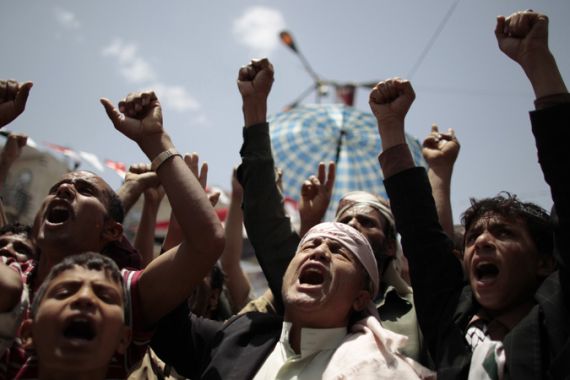Yemen rivals stage mass demonstrations
Rival protests take place after Friday prayers amid reports that President Saleh will soon return from Saudi Arabia.

 |
| Yemeni opposition parties remain determined to oust Saleh [AFP] |
Pro- and anti-regime camps in Yemen have staged mass protests urging embattled President Ali Abdullah Saleh to quit after state media said he would soon return to the country from Saudi Arabia where he is being treated for blast wounds.
Tens of thousands of Yemenis gathered in Sanna’s, the Yemeni capital, Change Square after morning prayers on Friday for the biggest rally since Saleh evacuated Yemen last week for medical treatment.
Sheikh Sadiq al-Ahmar, chief of the opposition Hashed tribal confederation, led about 10,000 people in a funeral procession through the square, as tribesmen carried the bodies of 41 of their fighters who they say were killed last week in fighting with government troops, the AP news agency reported.
As protesters marched they chanted, “The people want the butcher [Saleh] put on trial”, the agency said.
Thousands of people also took to the streets in Taiz, Yemen’s second largest city and a flash point in the anti-Saleh movement, where tribesmen have moved in to protect protesters who came under attack last week in a fierce crackdown by government troops.
In another area of Sanaa, located 5km away from Change Square, several thousand regime supporters held a rally under the slogan of “loyalty to Saleh” outside his presidential palace.
On Thursday they celebrated the news of his planned return, but opponents said they were working to ensure that, even if he does come back to the country, he will no longer be in power.
In recent days, government forces and tribesmen have been fighting in the city, trading gunfire and shelling.
Saleh’s health
US and Yemeni officials have said Saleh, 69, has 40 per cent burns on his body after an attack on his palace last Friday.
A government website dismissed dire assessments of his condition, saying his injuries were minor.
The claim was echoed by Vice-President Abdrabuh Mansur Hadi, who insisted Saleh was in good condition and that he would return to Yemen within days.
Saleh, who has ruled Yemen for three decades, has not been seen since being flown for surgery to Saudi Arabia.
There have been conflicting reports about his health since he left for Riyadh, the Saudi capital, on Saturday for treatment for wounds sustained in the attack.
A Saudi official said the Yemeni president’s health was “stable”, adding that he was waiting for doctors to “appoint a date for cosmetic surgery”.
Saleh would undergo an operation to treat “light burns on the scalp,” he said, adding “reports on the deterioration of his health condition are baseless”.
But as the president recovers, opponents who have been protesting for his departure since late January are pushing his deputy to establish an interim ruling council.
Saleh has come under mounting international pressure to quit as five months of protests have drawn in powerful tribes, sparking deadly fighting with loyalist security forces on the streets of Sanaa.
A British minister said on Thursday in Abu Dhabi that Saleh’s absence abroad leaves room to push for a transition of power as proposed by Yemen’s Arab neighbours in the Gulf.
“We know that the president was badly hurt in the explosion. Those injuries would keep him in hospital for some time,” said Alistair Burt, Britain’s under-secretary of state at the foreign ministry.
“Our sense is that this provides an opportunity” for a Gulf initiative for Saleh to stand down in return for immunity from prosecution, he said.
Fragile ceasefire
Sanaa has been under a fragile ceasefire since Saleh’s evacuation, with government troops still deployed in the streets where they once battled al-Ahmar’s tribal fighters.
More than 200 people were killed in the capital and thousands fled over two weeks in clashes between his loyalists and the forces of Sheikh al-Ahmar who backs the protesters.
The situation has raised fears of a new explosion of violence if a political solution is not found soon, or if the president does indeed return.
His departure from the country has also reignited a separatist rebellion in the south, where a civil war erupted in 1994 after the unification of Saleh’s north with formerly independent South Yemen.
Saleh has also faced a Shia rebellion in the north.
Earlier on Friday, suspected rebels attacked an army checkpoint on the outskirts of southern al-Habilayn in Lahj province, local officials said, according to a Reuters news agency report.
Five soldiers and three suspected rebels died in the ensuing skirmish, the agency said.
One woman was killed and two were injured when government planes attacked the town of Jaar in the southern province of Abyan, Reuters reported, citing residents.
Islamic fighters have seized the province’s capital, Zinjibar.